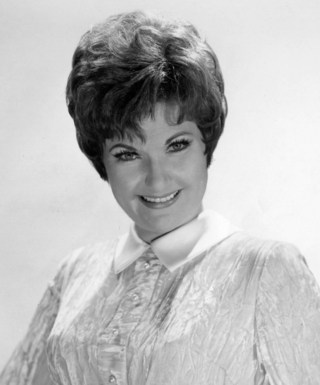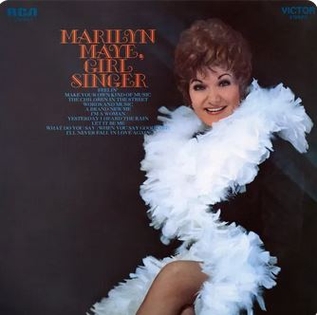
With All My Heart and Soul is a studio album by American country music artist Dottie West. It was released in January 1967 on RCA Victor Records and was produced by Chet Atkins. It was West's fourth studio album as a recording artist after having her first major hit in 1964. The album included 12 tracks, including the single "Paper Mansions". The song became a top ten hit on the Billboard country chart following its release. The album itself would also chart on a similar Billboard country albums survey.

Dottie West Sings Sacred Ballads is a studio album by American country music artist Dottie West. It was released in July 1967 on RCA Victor Records and was produced by Chet Atkins. The album was West's sixth studio effort and only gospel music collection to be released during her career. The album did not spawn any singles nor did it reach positions on any national publication charts.

I'll Help You Forget Her is a studio album by American country music artist Dottie West. It was released in November 1967 on RCA Victor and was produced by Chet Atkins. West's seventh studio effort, I'll Help You Forget Her was also her fourth studio offering in 1967. It included the single "Like a Fool", which became a major hit. The album itself would reach peak positions on national publication charts.

What I'm Cut Out to Be is a studio album by American country music artist Dottie West featuring the title song written by Red Lane. It was released in March 1968 on RCA Victor Records and was produced by Chet Atkins. It was West's eighth studio recording issued during her career. The album was a collection of new recordings and cover versions. The album did however reach peak positions on national publication charts at the time of its release.

The discography of American country artist Skeeter Davis contains 32 studio albums, 18 compilation albums, 59 singles, 53 lead singles, six collaborative singles, two other charted songs and two additional appearances. Davis was first one half of the duo, The Davis Sisters before embarking on a solo career with the RCA Victor label. Her second single was 1957's "Lost to a Geisha Girl", which reached the top 15 of the American Billboard Hot Country Songs chart. It was followed in 1959 by the top five country selection, "Set Him Free". The same year, Davis's debut studio album was issued on RCA Victor titled I'll Sing You a Song and Harmonize Too. Her career momentum continued to build in 1960 with two top five back-to-back singles: "(I Can't Help You) I'm Falling Too" and "My Last Date ". Both selections also climbed into the Billboard Hot 100 top 40. They were featured on Davis's second studio album called Here's the Answer. Between 1961 and 1962, Davis had top ten Billboard country singles with "Optimistic" and "Where I Ought to Be".

The Best of Connie Smith is a compilation album by American country singer Connie Smith. It was released in September 1967 via RCA Victor and featured 12 tracks. The disc was Smith's first compilation project released in her career and featured her most popular singles made commercially successful between 1964 and 1967. It also featured one new recording titled "I'll Come Runnin'". Penned by Smith herself and released as a single, the song became a top ten hit on the American country songs chart in 1967.

The Best of Connie Smith Volume II is a compilation album by American country singer Connie Smith. It was released in March 1970 via RCA Victor and contained ten tracks. It was the second "Best Of" compilation released by the RCA Victor label that featured Smith's musical output. The disc compiled Smith's most popular singles between 1967 and 1969. The album reached the top 30 of the American country albums chart following its release. Also included was two new recordings. Of these new recordings, one was released as a single in 1969. Titled "You and Your Sweet Love", it reached the top ten of the country singles chart.

Marilyn Maye McLaughlin is an American singer, musical theater actress and masterclass educator. With a career spanning eight decades, Maye has performed music in the styles of cabaret, jazz and pop music. She has received one nomination from the Grammy Awards and had commercial success as a recording artist.

I'm Only a Woman is a studio album by American country music artist Dottie West. It was released in May 1972 on RCA Victor Records and was produced by Jerry Bradley. The project was West's nineteenth studio album. Among the album's ten tracks were two charting singles issued between 1971 and 1972. It was West's only studio release issued in 1972 and third studio album not receive a Billboard chart placement.

Have You Heard...Dottie West is a studio album by American country music artist Dottie West. It was released in October 1971 on RCA Victor Records and was produced by Jerry Bradley. The album was West's eighteenth studio record released in her career and second record to be released in 1971. The album included ten tracks, two of which became singles. The first single, "Six Weeks Every Summer ", became a minor hit on the country charts.

The discography of American singer Marilyn Maye contains 13 studio albums, two compilation albums, two live albums, 13 lead artist singles, two promotional singles and four additional album appearances. Her debut studio album appeared in 1961 called Marilyn...the Most. Signing with RCA Victor, her second studio album was released in 1965 titled Meet Marvelous Marilyn Maye. It was followed in 1966 by the live album, The Second of Maye, and a studio album, The Lamp Is Low.

Meet Marvelous Marilyn Maye is a studio album by American singer Marilyn Maye. It was released in August 1965 via RCA Victor and contained 12 tracks. It was the second album of Maye's career and her first with the RCA label. It contained songs from musicals and also featured covers of jazz vocal standards. It was reviewed positively by Billboard magazine following its release in 1965.

The Second of Maye is a live album by American singer Marilyn Maye. It was released in April 1966 via RCA Victor and it contained 12 tracks. The project was recorded in a live format at The Living Room, a performance venue located in New York City. It was the second album of Marilyn Maye's issued by the RCA Victor label and her first live album. It was met with favorable reviews following its release.

The Lamp Is Low is a studio album by American singer Marilyn Maye. It was released in October 1966 via RCA Victor and contained 12 tracks. The album was a mixture of both original material and cover songs. Of its cover songs were recordings from 1960s films and jazz standards. Among its Jazz tracks was the album's title track. It received positive reviews from Billboard and Cashbox magazines. The album has been considered a "classic" disc since its original release.
"Sherry!" is a song composed by James Lipton and Laurence Rosenthal. It was first recorded in 1966 by American singer Marilyn Maye whose version was released as a single by RCA Victor. It later appeared in the Broadway musical also titled Sherry!. The show premiered in 1967, however, it was never recorded until 2004. "Sherry!" was then recorded for the cast album by American television actress Carol Burnett.

A Taste of "Sherry!" is a studio album by American singer Marilyn Maye. It was released in February 1967 by RCA Victor and contained 12 tracks. The album featured Maye's first commercially successful singles: "Cabaret" and "Sherry". Both were featured in Broadway musicals of the same names and both reached the top ten on the American adult contemporary chart. A Taste of "Sherry!" received positive reviews from several publications following its release.
"Step to the Rear" is a song written by Elmer Bernstein and Carolyn Leigh. It was originally performed in the Broadway musical How Now, Dow Jones between 1967 and 1968. It was first recorded on an official cast album in 1968. It was notably recorded by American singer Marilyn Maye, whose version was released as a single. Maye's version reached the top five of the American adult contemporary chart and was seen on televised advertisements for Lincoln and Mercury cars. It was adapted into the University of South Carolina’s fight song as The Fighting Gamecocks Lead the Way.

The Happiest Sound in Town is a studio album by American singer Marilyn Maye. It was released in September 1968 via RCA Victor and contained 11 tracks. It was the sixth studio album of Maye's career featuring songs that were categorized as easy listening material. It featured cover of popular recordings along with new material.

Marilyn Maye, Girl Singer is a studio album by American singer Marilyn Maye. It was released in April 1970 via RCA Victor and was the seventh studio album of her career. It was also her final album released by RCA Victor. Girl Singer contained a total of 11 tracks. Two tracks were originally singles. The 1968 single "Feelin'" became a top 20 song on the American adult contemporary chart. Girl Singer was given a positive review from Record World magazine following its release.
"It's Dawned on Me You're Gone" is a song originally recorded by American country artist Dottie West. Released as a single in 1970, it became a top 40 chart single on the US country music chart. The single was issued on the 1970 album Country and West. It was given positive reviews by Billboard and Cashbox following its release.

















